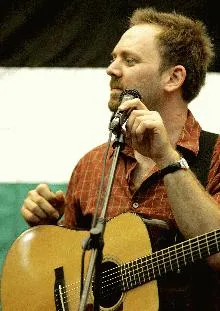Story behind the song
Song for Big Mountain
David Rovics
Hi folks,
David Rovics here. Taking a day for checking email after a week more or less away from electricity and phone lines... I thought I'd send out the lyrics to a song I wrote after listening to the people of Big Mountain talk about their situation, and I thought I'd share a few other thoughts, too. (For one thing, if you're in the area tomorrow night -- Tuesday, February 8th -- I'll be part of a concert in the army tent at Camp Anna Mae.)
What I've been seeing at Big Mountain is some really beautiful stuff, along with the really disturbing stuff, like the strip mines and the planned "relocation" of the Dineh elders and their families living there.
On the beautiful side first, it's wonderful to see the support that's coming in from all around the world. (On February 1st, there were several hundred people present, including dozens from Japan, a dozen or so from Germany, as well as people from Sweden, France, Italy, Denmark, and all over Canada and the US.) Of course it'd be nice if the numbers were greater and the activists coming in had bigger loads of supplies and other things necessary for the struggle, but so many of the folks I've met who are coming in to help out are really good people, who give me hope.
And continuing with the beautiful side, there are the Dineh people, and the land, the hogans, the stars at night, the sheep...
I, like many readers, have long ago realized that the lies I learned in school about many things were just that. I have known for some time that the genocide here on Turtle Island was far from complete, and that millions of American Indians still live, work, play, rot away in the prisons, and otherwise continue to make their lives on the land now known as the United States.
But it is something entirely new for me to see communities of Dineh (Navajo) people, with old, middle-aged, and sometimes young people speaking the Dineh language as a first language, with many elders not speaking a word of English, and even many younger people only somewhat fluent in a language other than Dineh. And to see not only this linguistic element, but so much of the traditional life continuing. Herding sheep, living in hogans, gathering wood for the fire, having sweats, singing, drumming, and perhaps most powerfully, identifying with the land with such emotion, such passion, so completely. Opposing the coal mining and the relocation with every fiber of their being.
I think of so many people I know, and I think of what a gift it could be for them to come help the elders at Big Mountain. Because of the current situation with the authorities forcing people to move off their land, many younger people are no longer on the land, and the elders need help with their sheep, with cutting wood, and with other aspects of daily life. Of course people should come prepared, and only those should come for whom the primary interest is to help the elders in their struggle to survive and to resist relocation (and to help the planet, by extension). But the gift you will inadvertently receive will probably seem so much greater than the gift of your time and energy...
On the negative side (which I already touched on, hope you'll excuse my circuitous writing here), it's kind of mind-boggling to see first-hand that pretty much every aspect of what we know of as the genocide of the native people of this land is continuing right now, as I write. Even for a relatively cynical leftist such as myself, it's shocking to see these elderly Dineh women, dressed in their colorful skirts, with their old eyes that seem to take in so much, gathering together to talk to a lawyer (daughters and sons translating from Dineh into English) about their legal chances to be able to remain on the land that they've lived on for generations, so that it doesn't turn into a coal mine.
I guess some part of my suburban Connecticut high school education is still with me. This idea that the theft and destr

